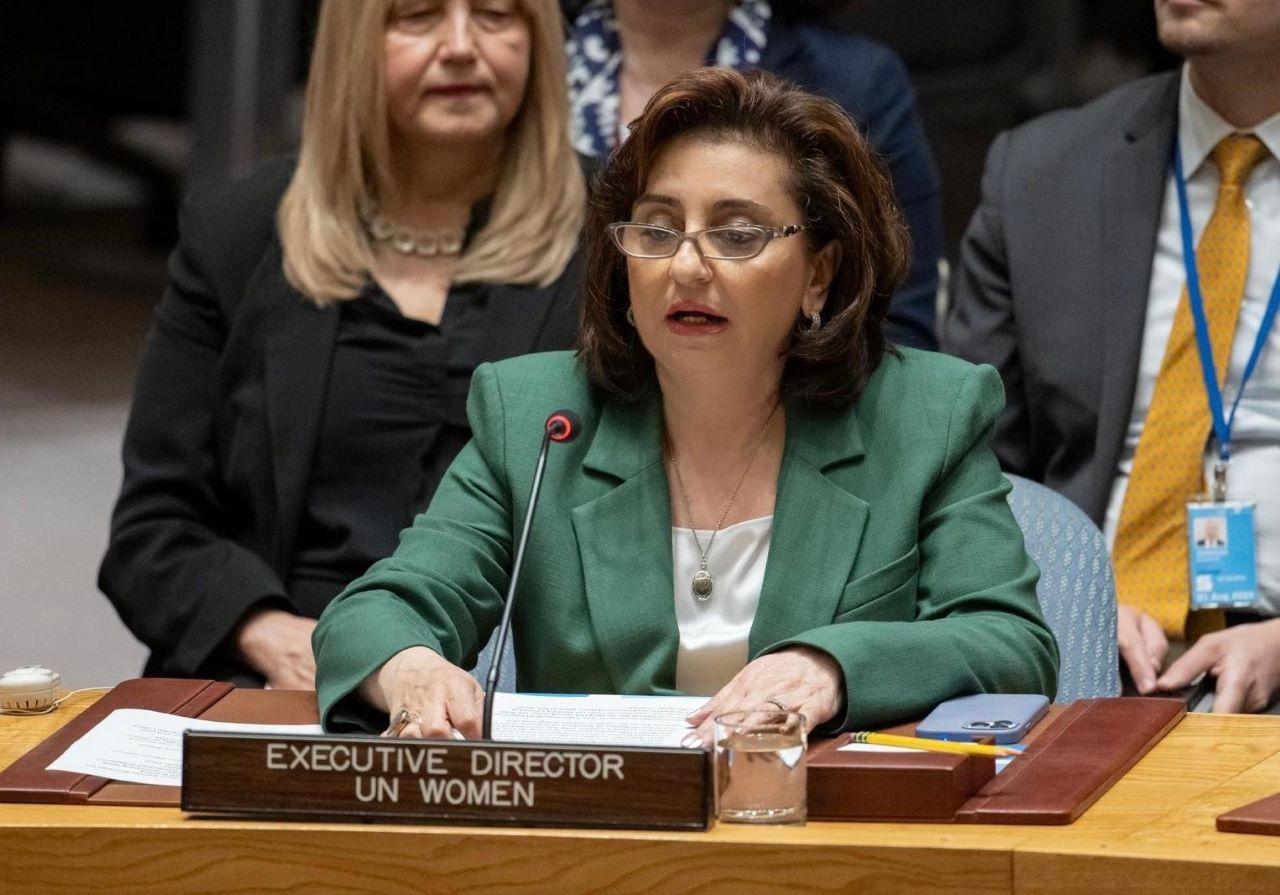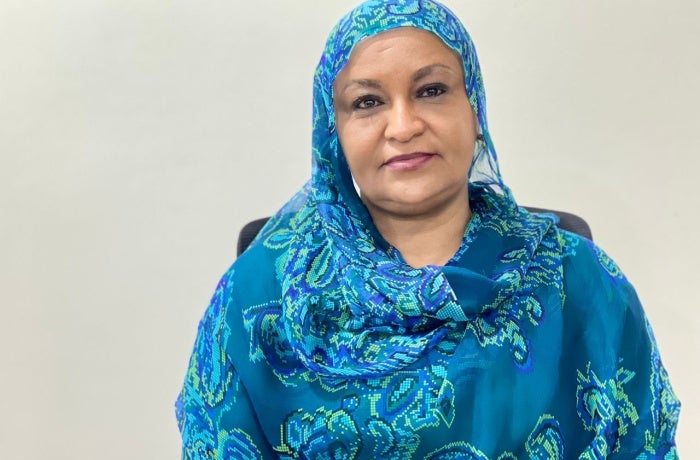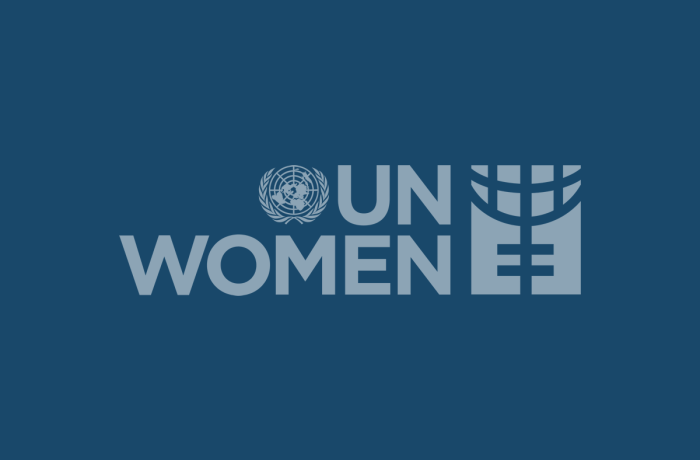Speech: ‘Facing unacceptable prospects together’
Statement delivered by Ms. Sima Bahous, UN Under-Secretary-General and UN Women Executive Director, to the UN Security Council meeting on Sustaining WPS Commitments in the context of accelerated drawdown of peace operations
[As delivered]
This last quarter century has seen the Security Council acknowledge the centrality of gender equality for peace in decision after decision. It does so because the evidence is clear and uncontested. Gender equality supports conflict prevention and post-conflict recovery. Gender inequality makes conflict more likely and peace less durable.
Gender equality is thus at the heart of the UN’s peace and security apparatus and of peacekeeping. The United Nations' peacekeeping efforts, led and guided by this Council, have a proud history of contributing to the avoidance of renewed militarization in post-conflict societies. Part of that history has also been a contribution to gender equality.

In the Democratic Republic of the Congo, for example, the UN mission has helped relocate many women human rights defenders to safer locations in recent years, facilitated women’s representation in local community dialogues in the peace process, reaching 30 and 40 per cent in several localities, and has contributed to the conviction of dozens of members of armed groups and security forces for conflict-related sexual violence.
Special political missions, too, have played an important role in achieving the modest but steady gains we have seen across countries in crisis on women’s political participation and representation, even in the most challenging contexts. In Somalia, the UN mission has been one of the most consistent supporters of the political aspirations of Somali women, as they fight for better representation through quotas and changes in the electoral code.
UN Women is concerned about the potential effects of multiple recent decisions to shrink or close both peacekeeping and special political missions. These decisions are made even as the number and intensity of conflicts and insecurity grow.
It is counter-intuitive that, in the face of unprecedented levels of conflict and violence, the number of deployed peacekeeping personnel has dropped by almost half from 121,000 in 2016 to approximately 71,000 in 2024.
This reality takes place against a backdrop of growing misogyny and violence against women and girls. It is apparent in the wars we see and the wars we fear and the clear disregard in their conduct for the lives, welfare, rights and autonomy of women and girls. I would like to thank Sierra Leone for proposing this debate, for providing the space for this crucial discussion and for affording us as UN Women the opportunity to share our perspectives. Thank you, Madame.
In the final months of 15 consecutive years of UN peacekeeping in Haiti, the Security Council heard from the Executive Director of one of Haiti’s largest nongovernmental healthcare providers and social justice organizations. She asked the Security Council that, in the event of a mission transition or drawdown, the Security Council ensure that gains made on gender equality be protected including through the provision of necessary resources, a reasonable request very much in line with the stated priorities of the Security Council.
That was April of 2019. Ten months later the peacekeepers had left. Another representative of Haitian women’s civil society came to brief this august body. She told the Council about armed gangs who were raping women and filming and posting the rapes on social media. She shared that gang-rape was becoming a political weapon, a pre-meditated and explicit expression of defiance of law enforcement. She stated that entire areas were controlled by armed gangs, better armed and equipped than the police. She spoke of kidnappings, of terrified students unable to go outside, of closed courts in the capital since the peacekeeping mission left. That was four and a half years ago, and the reality she described is very much a reality today.
Almost 5,000 cases of rape were reported to case managers and service providers in Haiti in 2023, with homicides, kidnappings, and sexual violence rising every year with no sign of slowing down.
Around the same time, at the annual debate on women, peace and security in 2019, a young activist from Sudan, who had become an icon of that year’s revolution, told the Security Council that women had already been sidelined in the political process in the months following that revolution. She shared her skepticism that the 40 per cent quota for women in the Transitional Legislative Council that had been promised would ever materialize. She asked, among other things, that the Security Council halt the scaling down of the peacekeeping mission until the security situation was more stable and the protection of civilians more assured. Yet, despite these warnings, a year later, UNAMID was closed. And so today, in Sudan, with no peacekeeping or political mission in place, famine is imminent and thousands of new mothers could die in the next few months, all as women and girls are subjected to all kinds of cruelties and violence of which I believe you are all well aware.
The Security Council resolutions have been clear. Resolution 2594 in 2021 called for comprehensive gender analysis and gender expertise informing any UN transition from the start; for women’s full, equal, and meaningful participation in all sequenced stages of the mission and the transition; and for the gains made on gender equality and women, peace and security to be sustained. It did so in the recognition that this saves lives, empowers women, and protects them from harm. These direct instructions built on years of similar language in other Security Council decisions and UN policy and guidance.
Despite this, these directives are often not put in practice.
This is why UN Women is acutely concerned about the current trend of closing of space and support for UN missions in ways that are too precipitous to allow for the proper involvement of women or the prioritization of gender equality.
Take Mali, for example, where the short time afforded to close the mission meant that no work on women, peace and security or gender advisers or officers were transferred to State authorities or to the United Nations Country Team. This is but one example.
For more than six years, UN Women has been working closely with the Department of Peace Operations to strengthen the gender-responsiveness of UN transitions, from agreed minimum requirements, to joint analysis, planning, and capacity building, engaging together with national partners, to co-locating staff and sharing assets. In that period, we have identified many gaps. I will highlight three today.
First, women and issues of gender equality more broadly are often under-represented or absent in negotiations with host countries over mission drawdowns or departures. In some cases, women are mentioned only as victims in need of protection, rather than as partners in the transition, including the many women’s rights organizations that could inherit crucial functions undertaken by the departing mission if only they were given adequate support. Women are also excluded from decisions about security matters or security architecture.
Second, gender-responsive conflict analysis is often left out of planning exercises at their start, and only undertaken later with resources that need to be fundraised for separately, or by repurposing flexible funding from UN Women.
Third, the money spent on UN missions is not reallocated to peacebuilding or sustainable development once they leave, whether through the UN Country Team or other national partners. As soon as the UN experiences a sharp drop in budgets and presence, gender expertise and programming is all too often de-prioritized first.
In order to address these concerns, I offer three solutions.
First, we recommend that the Security Council ensure that UN transitions safeguard gender equality gains and women’s meaningful participation in all possible ways. This includes doing so routinely through decisions and statements, in interactions with host governments and with any regional or sub-regional organizations undertaking peacekeeping support.
Second, for the Council to continue to invite women from civil society to routinely brief and to provide analysis of their context from a gender perspective. And for the Informal Expert Group to conduct field visits to countries after the departure of a UN mission to monitor and report on the situation of women and girls so that this analysis can be included in decision-making.
Third, we recommend that the Security Council turn its attention more fully to financing. The role of the Peacebuilding Fund is essential for this as is stronger collaboration with international financial institutions. In addition, all drawdowns should include plans to sufficiently allocate resources to women, peace and security work, to sustain gains made.
Ultimately, in some cases, the accelerated departures are based on political timetables and do not fully reflect on-the-ground realities.
We believe that the Security Council and international partners have the capacity to engage host governments to prevent such hurried transitions in particular in the interests of the protection of the rights of women and girls. We cannot allow the tools, carefully crafted over decades by this esteemed body to advance the women, peace, and security agenda, to be discarded. They are too valuable, too crucial to women and girls.
We fear a future of increasing atrocities against women, their ever-greater marginalization from decision-making and ultimately a failure of the international community. That prospect should be, and I am confident is, unacceptable for all of us.
We have an opportunity this fall, with the Summit of the Future, and next year, as we mark 30 years since the Beijing Declaration and Platform for Action, to double down on efforts to advance women´s rights and to bolster commitments made in Beijing, in SDG5 and in the many resolutions on Women, Peace and Security of this Council.
UN Women remains at your side as we work collectively in the service of this Council’s consistent decisions for women, peace and security.
I thank you.







